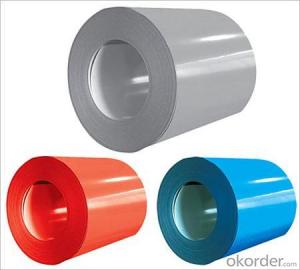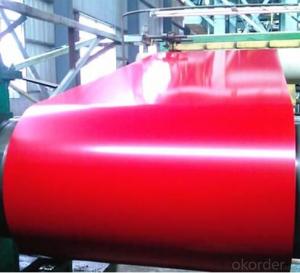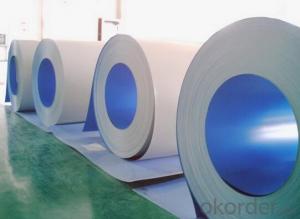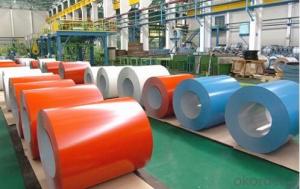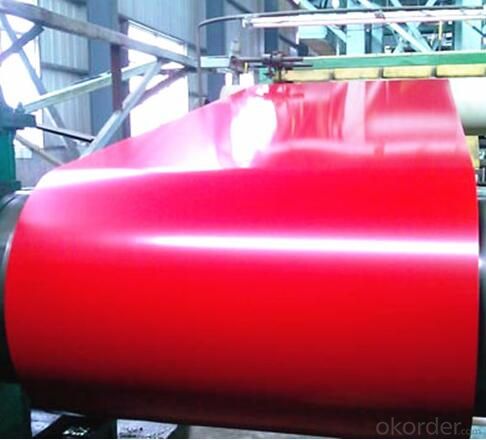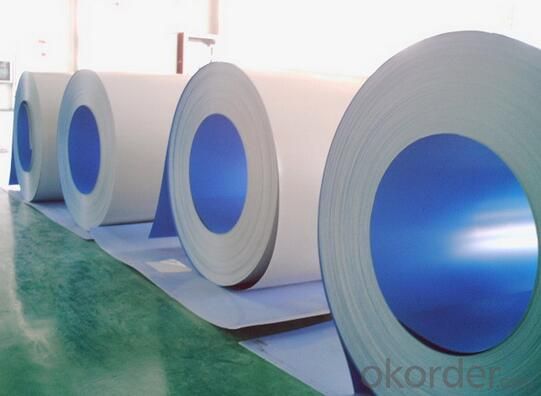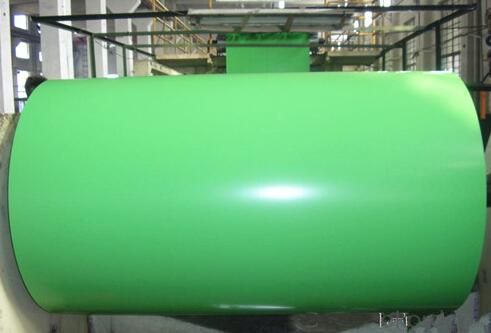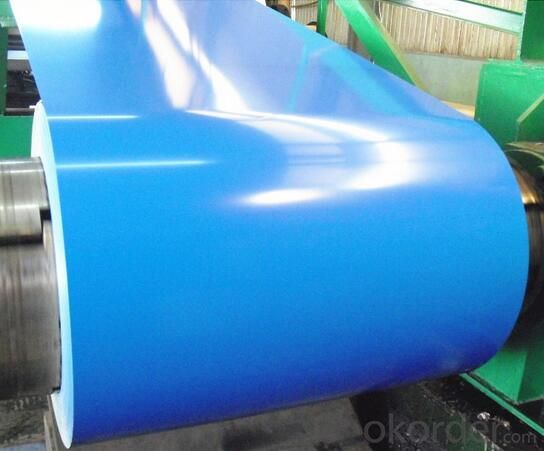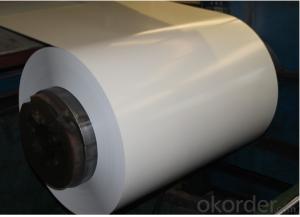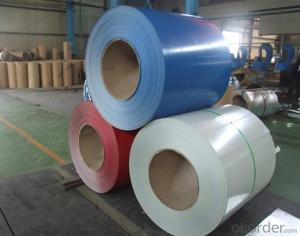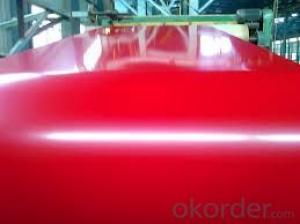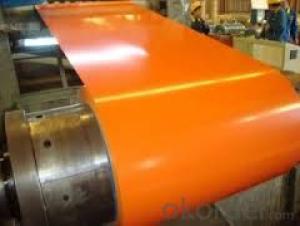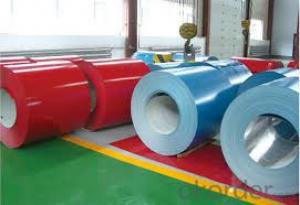PPGI Prepainted Galvanized Steel Roof Sheets in Coils
- Loading Port:
- Tianjin
- Payment Terms:
- TT OR LC
- Min Order Qty:
- 30 m.t.
- Supply Capability:
- 10000 m.t./month
OKorder Service Pledge
OKorder Financial Service
You Might Also Like
Specification
PPGI Prepainted Galvanized Steel Roof Sheets in Coils
Details of PPGI Prepainted Galvanized Steel Roof Sheets in Coils
Grade | DX51D, SGCC, CGCC |
Thickness | 0.15mm-1.5mm |
Width | 600mm-1500mm(914/1219/1250 are available) |
Standard | JIS G3312, ASTM,GB/T1275 |
Certificate | ISO9001.ISO14001.OHSAS18001 |
Length | As per requests |
Zinc Coating | 40g-275g/m2 |
Lacquer Coated | 20-25 microns/5-15 microns |
Coil ID | 508mm/610mm |
Coil Weight | normally 3-10mt or as your requirement |
Supply ability | 200,000Mt/year (MOQ:25Mt) |
Color | RAL No. |
Price terms | FOB,CFR,CIF |
Payment terms | L/C,T/T |
Deliver time | 30days after received deposit or L/C |
Packing | Standard exporting package |
steel strip Water proof paper, metal covers, | |
Application | Corrugated roofing,outside building, |
boating building,car producing | |
household appliance | |
Main market | Southeast Asia , the EU, Russia, Ukraine , Latin America and other countries and Regions |
Specification of PPGI Prepainted Galvanized Steel Roof Sheets in Coils
Thickness | Width | Length of plate | Inner diameter of coil |
0.18-1.2mm | 800/914/1000/1200/1219/1250mm | 1000-6000mm | 508mm/610mm |
Coated Mass: | |||
Available Coated Mass(g/m^2) | Base plate | Available Coated Mass(g/m^2) | |
60,80, 100, 120, 160, 180 | Galvanized Steel | 60,80, 100, 120, 160, 180 | |
50, 70, 150 | Galvalume Steel | 50, 70, 150 |
Painting | Item | Code | |
Polyester | PE | ||
High-durability polyester | HDP | ||
Silicon modified polyesters | SMP | ||
Polyvinylidene fluoride | PVDF | ||
Easy-Cleaning | — | ||
Painting Thickness | Top side: 20±5microns; | ||
Bottom side: 5~7microns. | |||
Color System | Produce according to RAL Color System or as per buyer’s color sample. | ||
Painting structure | Top surface | Bottom surface |
|
Primer coating | No coating | 1/0 | |
Primer coating | Primer coating | 1/1 | |
Primer coating + Finish coating | No coating | 2/0 | |
Primer coating + Finish coating | Primer coating or single back coating | 2/1 | |
Primer coating + Finish coatin | Primer coating + Finish back coating | 2/2 | |
CNBM Introduction of PPGI Prepainted Galvanized Steel Roof Sheets in Coils
CNBM International Corporation is the most import and export platform of CNBM group(China National Building Material Group Corporation) ,which is a state-owned enterprise, ranked in 270th of Fortune Global 500 in 2015.
With its advantages, CNBM International are mainly concentrate on Cement, Glass, Iron and Steel, Ceramics industries and devotes herself for supplying high quality series of refractories as well as technical consultancies and logistics solution.
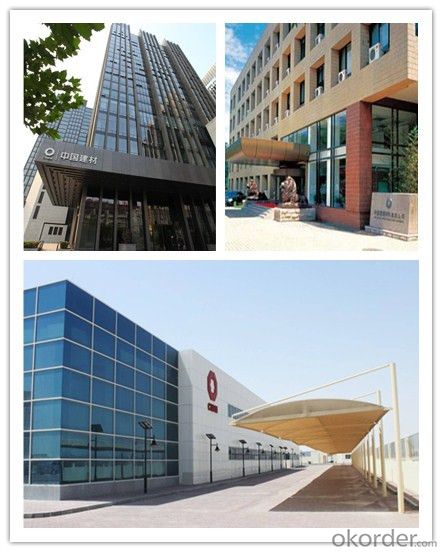
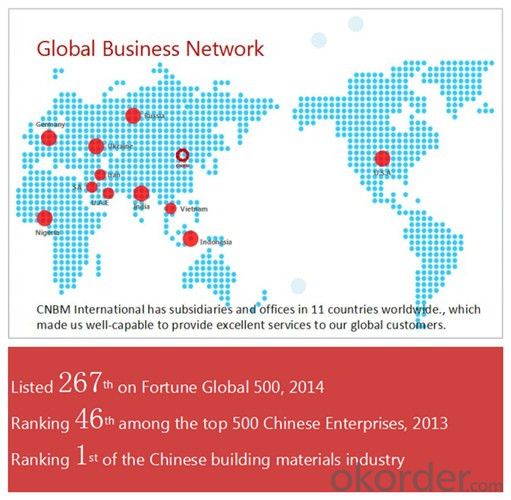
Packaging & Delivery of PPGI Prepainted Galvanized Steel Roof Sheets in Coils
Packaging Detail | Sea worthy packing /as per customer's packing instruction |
Delivery Detail | 15 ~ 40 days after receiving the deposit |
Products Show
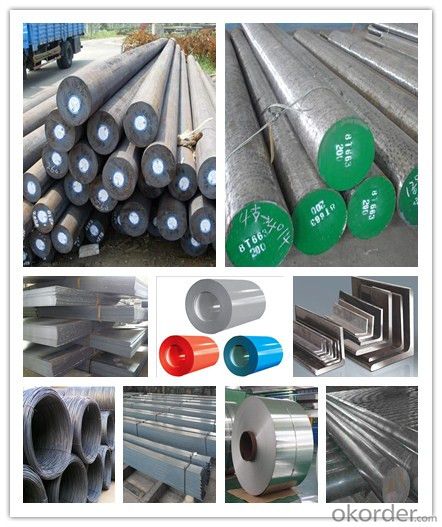
FAQ:
Are you a trading company or manufacturer? | Manufacturer |
What’s the MOQ? | 3 metric ton |
What’s your delivery time? | 15-35 days after downpayment received |
Do you Accept OEM service? | Yes |
what’s your delivery terms? | FOB/CFR/CIF |
What's the Payment Terms? | 30% as deposit,70% before shipment by T/T |
Western Union acceptable for small amount. | |
L/C acceptable for large amount. | |
Scrow ,Paybal,Alipay are also ok | |
Why choose us? | Chose happens because of quality, then price, We can give you both. Additionally, we can also offer professional products inquiry, products knowledge train (for agents), smooth goods delivery, excellent customer solution proposals. |
What's your available port of Shipment? | Main Port, China |
What’s your featured services? | Our service formula: good quality+ good price+ good service=customer's trust
|
Where are your Market? | Covering more than 160 countries in the world |
- Q: What are the different forging techniques used for special steel?
- Some of the different forging techniques used for special steel include open die forging, closed die forging, and ring rolling. Open die forging involves shaping the steel by hammering it between flat dies or anvils. Closed die forging, also known as impression die forging, utilizes dies that contain specific shapes to mold the steel into the desired form. Ring rolling is a technique used to produce seamless rings by shaping the steel through a combination of axial compression and radial expansion. These forging techniques allow for the production of high-quality and complex special steel components with desired properties and shapes.
- Q: Can special steel be used for manufacturing tools?
- Yes, special steel can definitely be used for manufacturing tools. Special steel refers to a specific type of steel that is carefully engineered and designed to possess certain properties and characteristics that make it suitable for specific applications. In the case of manufacturing tools, special steel is often preferred due to its exceptional strength, hardness, and durability. These properties enable tools made from special steel to withstand high levels of stress, wear, and impact, making them ideal for demanding applications such as cutting, drilling, shaping, and machining. Additionally, special steel can also exhibit excellent heat resistance, corrosion resistance, and dimensional stability, further enhancing its suitability for tool manufacturing. Overall, the use of special steel in tool production ensures the creation of high-quality, long-lasting, and efficient tools that can effectively perform various tasks in different industries.
- Q: How does special steel contribute to reducing weight in applications?
- There are several ways in which special steel can help to reduce weight in applications. Firstly, special steel alloys can be designed to have high strength-to-weight ratios. This means that they can provide the same level of strength and performance as other materials, such as traditional steel or aluminum, but with less weight. By substituting special steel for heavier materials, manufacturers can decrease the overall weight of the application without compromising its structural integrity. Furthermore, special steel can be manufactured with enhanced fatigue resistance and durability properties. This allows for the use of thinner and lighter sections without sacrificing strength. This is particularly crucial in industries where weight reduction is crucial, such as automotive and aerospace, as it enables the production of lighter vehicles or aircraft. As a result, fuel efficiency is improved and emissions are reduced. Moreover, special steel can also contribute to weight reduction through its versatility in manufacturing processes. It can be easily formed, shaped, and welded, allowing for the creation of complex and lightweight structures. This flexibility in fabrication methods empowers engineers to optimize the design and maximize weight savings by utilizing special steel in innovative ways. In conclusion, special steel aids in reducing weight in applications by offering high strength-to-weight ratios, improved fatigue resistance, and durability. Additionally, it provides versatility in manufacturing processes. These attributes make special steel an ideal choice for industries seeking weight reduction, ultimately resulting in enhanced performance, efficiency, and sustainability.
- Q: How does special steel perform in pharmaceutical applications?
- Due to its unique properties and characteristics, special steel is highly sought after in pharmaceutical applications. Its exceptional corrosion resistance is especially important in pharmaceutical environments where chemical substances and aggressive cleaning agents are commonly used. This corrosion resistance ensures the steel remains durable and maintains its integrity over time. Furthermore, special steel is renowned for its strength and durability, making it suitable for applications that involve heavy loads or frequent use. This strength allows the steel to withstand the demanding requirements of pharmaceutical processes, such as mixing, grinding, and sterilization, without compromising its structural integrity. Another significant advantage of special steel in pharmaceutical applications is its hygienic properties. It is highly resistant to bacterial growth and easy to clean, making it perfect for environments where cleanliness and sterility are of utmost importance. The smooth surface of special steel prevents the accumulation of dirt, bacteria, and other contaminants, reducing the risk of contamination and ensuring the safety and quality of pharmaceutical products. Moreover, special steel offers excellent temperature resistance, enabling it to endure extreme temperatures and thermal cycling commonly encountered in pharmaceutical processes. This thermal stability guarantees that the steel retains its mechanical properties and dimensional stability, even under fluctuating temperature conditions. Overall, special steel's corrosion resistance, high strength, hygienic properties, and temperature resistance make it a trustworthy and versatile material for pharmaceutical applications. Its exceptional performance in these challenging environments contributes to the production of safe and high-quality pharmaceutical products.
- Q: What are the different methods of machining special steel?
- There are several different methods of machining special steel, each with its own advantages and applications. Some of the most common methods include: 1. Turning: Turning is a machining process that involves rotating a workpiece while a cutting tool removes material from the surface. This method is typically used to create cylindrical shapes and can produce high-quality finishes. 2. Milling: Milling is a versatile machining method that uses rotary cutters to remove material from a workpiece. It can be used to create complex shapes and contours, and is often employed in the production of special steel components. 3. Drilling: Drilling is a machining process that involves creating holes in a workpiece using a rotating cutting tool. It can be used to create both through holes and blind holes in special steel, and is commonly used in various industries. 4. Grinding: Grinding is a precision machining method that uses an abrasive wheel to remove material from a workpiece's surface. It is often used to achieve tight tolerances and smooth finishes on special steel components. 5. Broaching: Broaching is a machining process that uses a sharp cutting tool with multiple teeth to remove material in a series of linear cuts. It is commonly used to create keyways, splines, and other intricate shapes in special steel. 6. Electrical Discharge Machining (EDM): EDM is a non-traditional machining method that uses electrical discharges to remove material from a workpiece. It is particularly useful for machining special steel with complex shapes or for creating small features. 7. Laser Cutting: Laser cutting utilizes a high-powered laser to cut through special steel with extreme precision. It is commonly used for intricate designs and can produce smooth edges without the need for subsequent processing. Each of these methods has its own advantages and limitations, and the choice of machining method depends on factors such as the desired outcome, the complexity of the part, and the properties of the special steel being machined.
- Q: How does special steel contribute to the infrastructure sector?
- Special steel plays a crucial role in the infrastructure sector by providing enhanced strength, durability, and resistance to various environmental factors. It is used in the construction of bridges, buildings, and other critical infrastructure projects, ensuring structural integrity and safety. Additionally, special steel is utilized in the manufacturing of machinery and equipment used in the sector, further contributing to its efficiency and reliability.
- Q: How does special steel contribute to the safety of infrastructure?
- The safety of infrastructure is greatly enhanced by special steel in several ways. Firstly, it possesses exceptional strength and durability, allowing for the construction of strong and resilient structures. Bridges, buildings, and tunnels can rely on special steel to withstand heavy traffic, strong winds, seismic activities, and even potential terrorist attacks. Furthermore, special steel exhibits excellent resistance to corrosion, making it ideal for infrastructure projects exposed to harsh environmental conditions. By preventing rust and decay, it prolongs the lifespan of structures and reduces the need for costly maintenance and repairs. This is particularly crucial in coastal areas, where saltwater can cause significant damage. Moreover, special steel has outstanding fire resistance due to its high melting point. This characteristic ensures that structures maintain their structural integrity even under extreme temperatures. In the event of a fire, this feature allows for additional time for evacuation and emergency response, thereby enhancing overall safety. Additionally, special steel enables innovative design solutions, further contributing to infrastructure safety. Its versatility allows for the creation of complex and efficient structures such as long-span bridges and skyscrapers. These designs often incorporate special steel components, such as high-strength beams or columns, which enhance overall stability and safety. In conclusion, special steel is an essential material for ensuring the safety and reliability of infrastructure. Its exceptional strength, corrosion resistance, fire resistance, and design flexibility enable engineers and architects to create structures capable of withstanding various challenges. By utilizing special steel in construction projects, lives and well-being of people who utilize these structures can be effectively protected.
- Q: What is the significance of phosphorus in special steel?
- Phosphorus plays a crucial role in special steel as it enhances its strength, hardness, and machinability. It acts as a grain refiner, reducing the grain size of the steel and improving its toughness. Additionally, phosphorus increases the steel's corrosion resistance and decreases its brittleness, making it more suitable for various industrial applications. Overall, phosphorus is a significant element in special steel, contributing to its overall performance and quality.
- Q: What are the requirements for special steel used in energy equipment manufacturing?
- The requirements for special steel used in energy equipment manufacturing include high strength, excellent corrosion resistance, and the ability to withstand high temperatures and pressures. It also needs to meet specific industry standards, such as those related to safety, reliability, and environmental sustainability. Additionally, the steel should possess good weldability and machinability to facilitate the manufacturing process.
- Q: What are the different methods for nitriding special steel?
- There are several methods for nitriding special steel, including gas nitriding, salt bath nitriding, plasma nitriding, and ion nitriding.
Send your message to us
PPGI Prepainted Galvanized Steel Roof Sheets in Coils
- Loading Port:
- Tianjin
- Payment Terms:
- TT OR LC
- Min Order Qty:
- 30 m.t.
- Supply Capability:
- 10000 m.t./month
OKorder Service Pledge
OKorder Financial Service
Similar products
Hot products
Hot Searches
Related keywords
